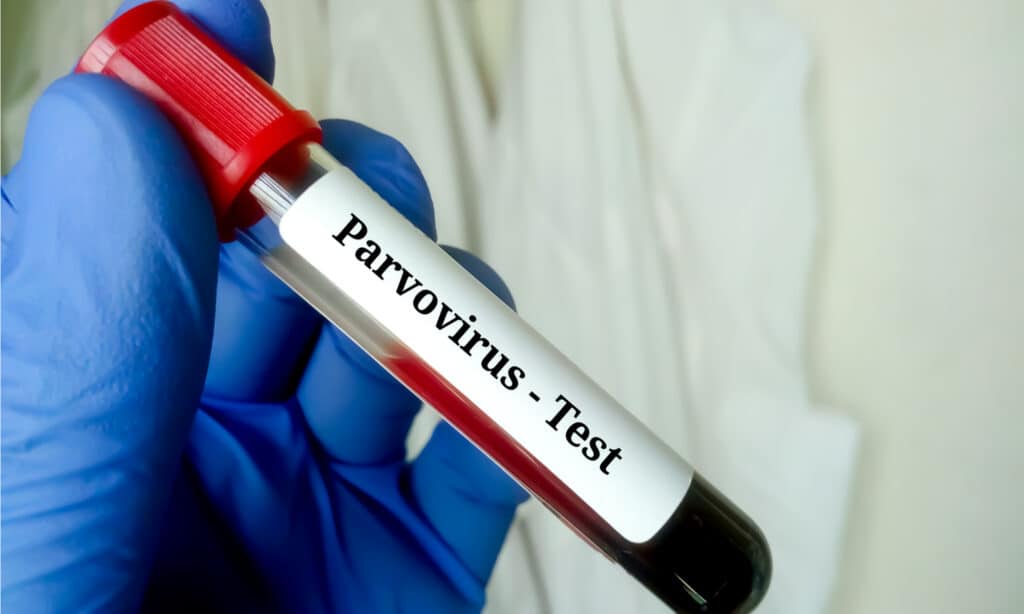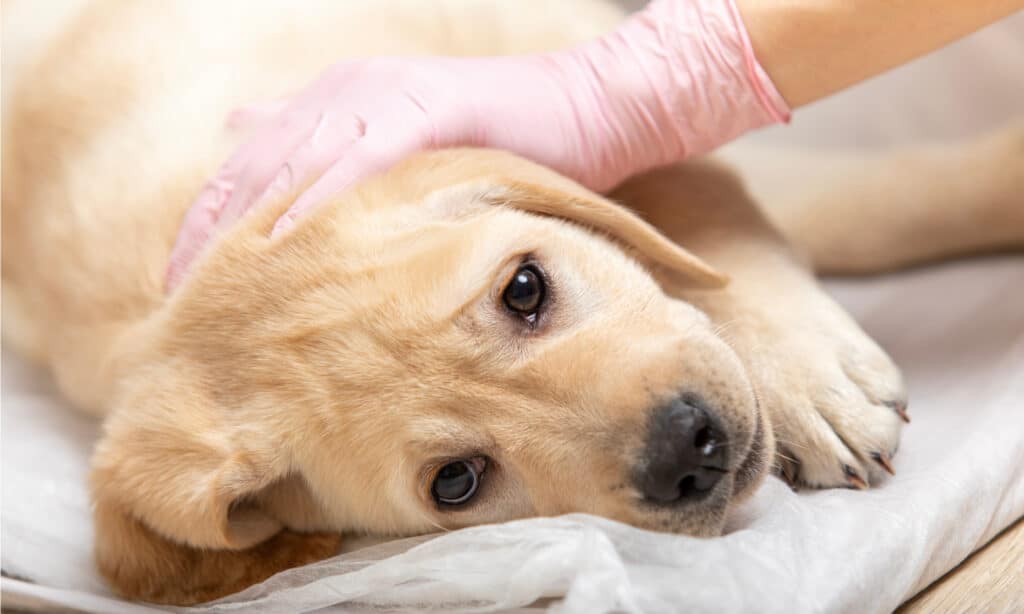We are warned about a lot of things when we get a new pup but serious infections are probably the most worrying. The disease that is mentioned a lot is Parvovirus – or ‘Parvo’ for short. This infection is both common and serious so as a new puppy owner, or even as a parent of an older dog, there are a few things that you need to know. How does a dog get Parvo? Can you prevent Parvo and what should you do if your think your dog has it? Read on and we will get you up to speed in no time.
What is Parvo?
Parvo is a short term for Parvovirus. This is a disease in dogs that is caused by canine parvovirus type 2 (CPV). It was first seen in Europe in the 1970s but soon spread throughout the world, including to the US. It does not just cause illness in domestic dogs, it is also found in coyotes, wolves, skunks and racoons. It is very closely related to the feline panleukopenia virus (FPV) which causes illness in cats.

©Saiful52/Shutterstock.com
How Does A Dog Get Parvo?
Parvovirus is a contagious disease which means that it is passed from one dog to another. The simple answer is that your dog can get Parvo from another infected dog. A dog that has Parvo sheds the virus in its poop and vomit. Therefore, if your dog comes into contact with the poop or vomit of an infected dog, they may get it. So, what does ‘coming into contact’ mean exactly?
Here are just a few ways in which your dog can be exposed to the virus and these are called direct transmission:
- Sniffing poop and vomit. This can transfer the virus to their nose and from here into their intestines.
- Licking poop and vomit. Pups do this a lot as they explore the world around them.
- Eating poop and vomit. Dogs often eat each other’s poop.
However, to understand the way in which Parvo is spread you need to be aware that viruses are very tiny. So, if there is a microscopic amount of poop or vomit on a surface, it can contain lots of viruses. These are some further ways in which it can spread and these are called indirect transmission:
- Eating from a contaminated food bowl. If one pup poops or vomits near or in a food bowl and then another pup eats from it, the infection can spread.
- Drinking from a contaminated water bowl. If you are in a park or café and your dog drinks from a water bowl that has previously been contaminated with another dog’s poop or vomit, they can get Parvo.
- Contaminated leashes, collars, and harnesses. All of these can get poop on them if a dog rolls in a pile of poop or vomit and they can get infected if they then bite or lick the leash, collar, or harness. Sadly, dogs love to roll in disgusting things!
- Human hands and clothing. It is easy to get tiny specks of poop and vomit (and therefore potentially viruses) on our hands and clothing. In this way, we can transfer the virus from one dog to another.
The parvovirus is quite hardy! It can survive for long periods (many months) outside even in cold conditions. It is also resistant to many household cleaning chemicals. This makes it almost impossible for you to avoid, especially if you live in an urban area where there is a high concentration of dogs.
How Likely Is My Dog To Get Parvo?
So, how worried should each owner be about their much-loved dog getting Parvo? Well, there are some criteria that make some dogs at higher risk than others so check your dog against this list.
What age is your dog?
Parvo is known as a puppy disease. This is because pups aged between six weeks and six months are most susceptible. Up until the age of six weeks the pups have antibodies from their mother’s milk (assuming she has been vaccinated). These are small proteins that circulate in the blood and fight off the viruses that cause disease. Older pups will be protected by vaccinations but we talk more about that below.
So, why are pups so susceptible? Firstly, they are more likely to be exposed because they sniff, lick and eat everything that they come across. Secondly, their immune system is not fully developed so they cannot fight off the disease. Finally, their body is immature and cannot cope with the symptoms as well as an adult dog. Things like diarrhea and vomiting can be life-threatening to a pup because their little bodies are not mature enough to deal with dehydration etc.
When pups are being weaned (transferred from their mother’s milk to solid food) their bodies are under a lot of stress. This weakens their immune system and makes them more susceptible to Parvo and secondary infections that can follow it.
What breed is your dog?
Some dogs are at a higher risk of getting Parvo although the reasons for this are not yet understood. These include Rottweilers, Doberman Pinschers, Labrador Retrievers, English Springer Spaniels, and German Shepherds.
For other reasons that are also not yet understood Toy Poodles and Cocker SpanielsCocker Spaniel are at less risk.
Is your dog well?
Dogs that are immunocompromised have immune systems that are not working properly. This puts them at a higher risk of many infections and not just Parvo.
A dog can become immunocompromised because of an illness, treatment, or age.
What is your dog’s lifestyle?
If you live in the middle of nowhere are your dog never comes into contact with any other dogs, they will be at a decreased risk of getting the disease. However, don’t forget that you can still carry it back to your home on your shoes and clothing. Also, your dog could come into contact with poop and vomit left in the countryside by infected wild dogs such as foxes.
Dogs that live in an urban environment and who go to doggy daycare with loads of other dogs will almost certainly be exposed at some time.
How Can I Tell If My Dog Has Parvo?
You can’t tell straight away. For between five and seven days after your pup gets infected, they will be perfectly normal. This is called the incubation period and during this time the virus particles are entering the cells of the body and multiplying. However, the incubation period can be as short as three days or as long as 14 days.
The specific symptoms in pups are:
- Very watery poops with blood in it (bloody diarrhea)
- Vomiting
- Fever
- Anorexia (not eating) and weight loss
- Lethargy (not wanting to move) and weakness
What Should I Do If My Dog Has Parvo?

©Olya Maximenko/Shutterstock.com
If you suspect that your dog has Parvo you must get them to a vet immediately. A puppy with Parvo is seriously ill and the sooner they start treatment, the more likely they are to survive.
Sadly, 70% of dogs that are not treated will die. However, only between 10% and 30% of dogs that are treated will die. Most pups will be treated with intravenous fluids, anti-nausea injections, and antibiotics. They need the fluids to stop them from getting dehydrated. The antibiotics do not kill the virus but stop bacteria from setting up infections in the pup’s body when they are in such a weakened state. Your pup may need special food to support their gut once they start eating again.
They will also be kept away from other dogs so that they cannot pass the illness on.
Because it is so infectious, you must keep a close eye on all the other dogs in your house and any other dogs that your pup has come into contact with.
How Can Owners Prevent Parvo?
The best way to prevent Parvo in pups is to give them their vaccination. In most areas, this is done at five to six weeks and boosters are given every 3 to 4 weeks until the pups are over 3 months or older. Pregnant dogs are given further boosters in pregnancy. Your vet will be able to advise you on this.
You can also protect your pup by keeping them away from other dogs and off the floor when they are very young. A dog carrier will allow you to take your pup out and about without the risk of infection.
The photo featured at the top of this post is © Javier Brosch/Shutterstock.com
Ready to discover the top 10 cutest dog breeds in the entire world?
How about the fastest dogs, the largest dogs and those that are -- quite frankly -- just the kindest dogs on the planet? Each day, AZ Animals sends out lists just like this to our thousands of email subscribers. And the best part? It's FREE. Join today by entering your email below.
FAQs (Frequently Asked Questions)
Can adult dogs get Parvo?
Yes, older dogs can get Parvo and they pick it up in the same way as pups. However, in adult dogs that do not have health problems it is usually a mild disease. It may just seem like a bit of an upset stomach. However, if your dog shows any of the symptoms listed above you should call your vet right away.
Can vaccinated dogs get Parvo?
It is very rare for a vaccinated dog to get Parvo but it can happen. For some reason, the vaccine does not work properly and they do not produce antibodies. This is why you should still be alert for the symptoms even in a vaccinated pup.
Can humans get Parvo?
Humans can get infected with a Parvovirus but it is a different virus from the one that dogs get. The human virus causes a range of symptoms including swollen joints and Fifth disease, which is also known as “Slapped Cheek” disease and is common in children. Parvovirus cannot pass between dogs and humans.
How long is a dog infectious with Parvo?
Dogs start to be infectious a few days after getting the infection and this may be before they get symptoms. The virus is present in their poop and vomit. They can carry on excreting it for 30 days – this may be after their symptoms have got better.
Thank you for reading! Have some feedback for us? Contact the AZ Animals editorial team.






